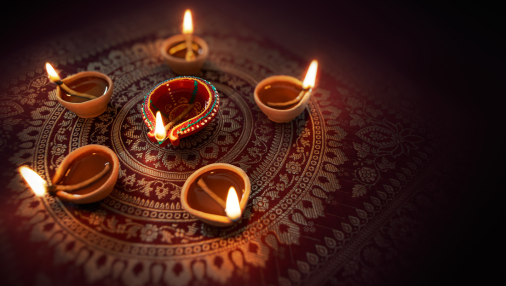🌟 Why We Celebrate Diwali – The Festival of Lights
Diwali, also known as Deepavali, is one of the most celebrated festivals in India and across the world wherever Indian communities live. Known as the Festival of Lights, Diwali symbolizes the victory of light over darkness, good over evil, and knowledge over ignorance. It is a festival that unites people of all religions, languages, and backgrounds with its message of hope, harmony, and prosperity.
🌼 The Mythological Significance
The origin of Diwali lies deep in Indian mythology and culture. There are several stories associated with its celebration, each reflecting the triumph of virtue and truth.
The most popular legend is from the epic Ramayana. It tells how Lord Rama, after defeating the demon king Ravana, returned to Ayodhya with his wife Sita and brother Lakshmana after 14 years of exile. The people of Ayodhya celebrated his return by lighting rows of earthen lamps, which gave rise to the name Deepavali—meaning “a row of lamps.”
In northern India, this story forms the central reason for celebrating Diwali — as the victory of good (Rama) over evil (Ravana).
In southern India, Diwali marks the victory of Lord Krishna over the demon Narakasura, symbolizing the destruction of evil and restoration of peace. In western India, it is associated with Lord Vishnu and Goddess Lakshmi. According to legend, on this day Lord Vishnu rescued Goddess Lakshmi from the prison of King Bali.
Each story conveys a similar moral: that goodness, truth, and light will always triumph over evil, lies, and darkness.
💰 The Festival of Wealth and Prosperity
Diwali is also deeply connected to Goddess Lakshmi, the goddess of wealth, prosperity, and fortune. On this day, people clean and decorate their homes to welcome her blessings. It is believed that Goddess Lakshmi visits the cleanest and brightest homes first.
Businessmen and traders also close their old account books and open new ones, performing “Chopda Pujan” or “Lakshmi Puja” to seek prosperity in the coming year.
This aspect of Diwali reflects India’s traditional values of hard work, honesty, and respect for divine blessings in every form of wealth—both material and spiritual.
🪔 Symbolism of Light
At the heart of Diwali lies the symbolism of light. Lighting diyas (lamps) signifies dispelling ignorance and embracing wisdom. The flickering flame of a diya represents the human soul—fragile, yet strong enough to light the world around it.
Every diya lit on Diwali night carries a powerful message: that even one small light can remove darkness. This spiritual symbolism encourages people to spread kindness, knowledge, and positivity.
🎆 Celebration Across India
The beauty of Diwali lies in its diversity. Every region celebrates it with its own customs and traditions:
- North India: Homes are decorated with lights, candles, and colorful rangolis. People perform Lakshmi Puja, exchange sweets, and enjoy fireworks.
- South India: Known as Naraka Chaturdashi, people start their day early with oil baths, wear new clothes, and burst crackers.
- West India: Gujaratis celebrate Bestu Varas, their New Year, with puja, feasting, and decorating homes with torans and diyas.
- East India: In West Bengal, Odisha, and Assam, Diwali coincides with the worship of Goddess Kali.
Despite the variations, the message remains the same—celebrating life, light, and renewal.
💫 Unity and Togetherness
Beyond mythology and rituals, Diwali plays a major role in bringing families and communities together. It is a time when people forget differences, visit relatives, exchange gifts, and share joy. The act of lighting lamps together or bursting crackers in open spaces reminds everyone of unity and collective happiness.
It also encourages charity and kindness. Many people donate clothes, food, and money to the less fortunate, ensuring that everyone can share in the joy of the festival.
🌍 Diwali Around the World
Diwali is not just confined to India. It is celebrated with grandeur in countries like Nepal, Sri Lanka, Mauritius, Fiji, Malaysia, Singapore, the UK, the US, and Canada. In 2023, even the White House in the United States hosted a Diwali celebration, highlighting its global appeal as a festival of peace and hope.
In Nepal, it’s known as Tihar; in Thailand, it’s Lam Kriyongh. Each version carries the same essence — celebrating life, light, and renewal.
🌱 Environmental Awareness in Modern Times
In recent years, many people have started celebrating an eco-friendly Diwali. Instead of bursting loud and polluting crackers, families are choosing to light earthen diyas, plant trees, and use natural decorations. This modern approach honors the traditional spirit of Diwali while protecting our planet.
🙏 The True Message of Diwali
Beyond lights, sweets, and celebrations, Diwali’s real message is inner illumination. It reminds us to remove negativity and hatred from our hearts, replace ignorance with understanding, and let kindness shine bright. It’s a time to reflect on our actions and renew our commitment to truth, compassion, and goodness.
As the lamps glow this Diwali, may they light up not just our homes but also our hearts with peace, prosperity, and positivity.

